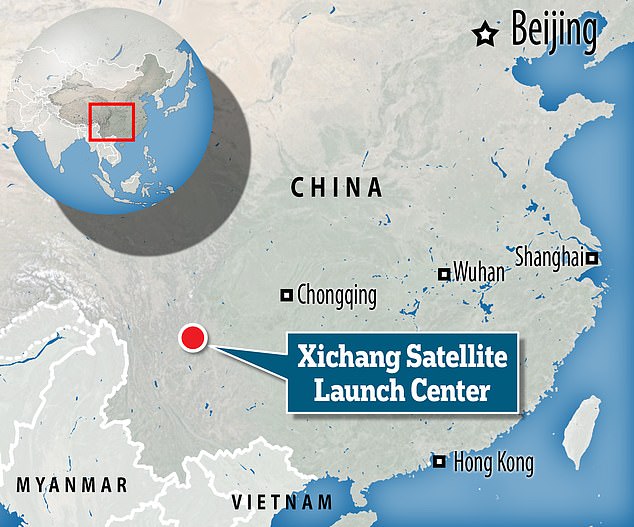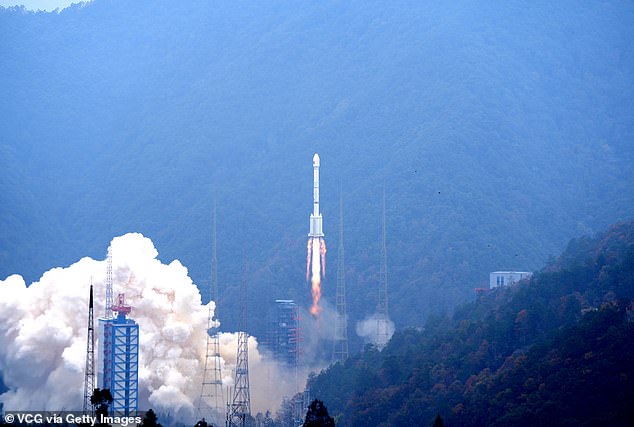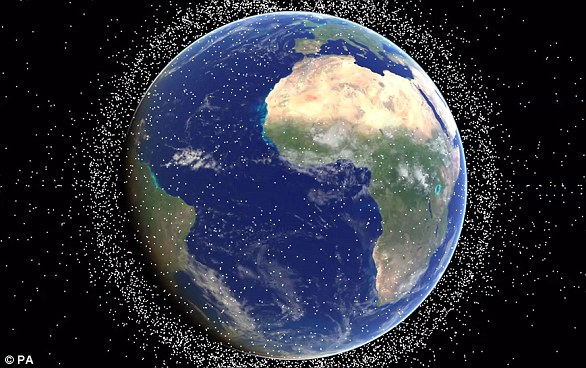Chilling videos show the terrifying moment a rocket booster fell from space and exploded METRES from homes in southern China
Terrified Chinese citizens have shared astonishing images of debris from a government missile hitting land.
Fragments of a rocket launched from the Xichang Satellite Launch Center on December 26 fell back to Earth a few hours later, causing extensive damage on the ground.
One video clip shows a huge piece of discarded machinery falling into a forested area of Guangxi province and exploding in a dramatic orange fireball.
Another clip shows huge pieces of rubble literally meters away from a house, as petrified bystanders gather in amazement.
It is unclear whether anyone was injured by the rocket's descent into land, but this is not the first time China has raised concerns about the space debris.

At around 11 a.m. local time on December 26, rocket debris crashed in a fireball in a forested area of Debao, Guangxi province.
China launched two satellites aboard a Long March 3B rocket from the Xichang Satellite Launch Center on Boxing Day. SpaceNews.com.
The satellites are part of Beidou, the satellite-based radio navigation system operated by the China National Space Administration, the government's space agency.
Both satellites were successfully placed into orbit, but not without dropping discarded parts of the rocket booster over China's Guangxi region.
Images of the rubble have now been shared to Chinese social media sites including Weibo and Douyin.
When the debris crashed into a village in Baise, Guangxi, petrified villagers gathered near the site, believing it was a UFO, according to AsiaWire.
State authorities quickly launched an investigation after the incident was reported and confirmed that the unknown object was in fact rocket debris, it added.
China had warned on December 26 that remnants of a missile would hit water, but made no mention of the likelihood of the remnants hitting land.

China launched two satellites aboard a Long March 3B rocket from the Xichang Satellite Launch Center on December 26

When debris crashed into a village in Baise, Guangxi (pictured) petrified villagers gathered near the site, believing it was a UFO.

Huge pieces of rubble lie literally meters away from a house, as bystanders gather in amazement
The country's Maritime Safety Administration said the debris would fall into the South China Sea, off the coast of the island province of Hainan, between 11 a.m. and noon.
China has already run into trouble because its rocket waste is dangerously falling back to Earth in populated areas.
Other space agencies such as NASA ensure that rocket debris breaks up into smaller pieces upon re-entry into the Earth's atmosphere – although this is not always successful.
Even Elon Musk's SpaceX designs parts of its rockets to descend quietly back to Earth for reuse.
When a rocket spread debris across the Indian Ocean in May 2022, NASA Administrator Bill Nelson blasted China for “failing to meet responsible standards.”
“Space nations should minimize the risks to people and property on Earth from re-entry of space objects and maximize transparency regarding those operations,” he added.
According to reports, in 2020, debris from a Long March 5B fell on villages in Ivory Coast, Africa, damaging several buildings.

View of the Long March-3B rocket, carrying two new satellites for the BeiDou-3 navigation satellite system, taking off from the Xichang Satellite Launch Center on December 26, 2023
There are no known casualties in such an incident, but scientists suggest it is only a matter of time.
A 2022 study concluded that there is a 10 percent chance that an out-of-control rocket or spacecraft could kill someone before 2032.
Any debris that doesn't fall back to Earth begins orbiting our planet and becomes what is commonly known as “space junk.”
These fragments float around in space hundreds of kilometers above Earth and risk colliding with satellites or even a space station.
According to NASA, there are approximately 23,000 pieces of debris larger than a softball orbiting the Earth.

